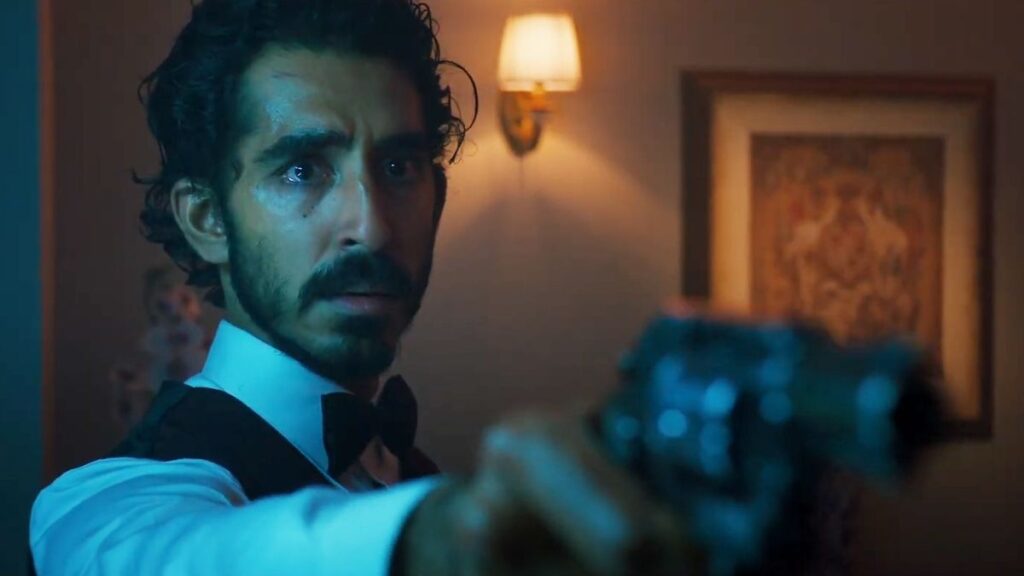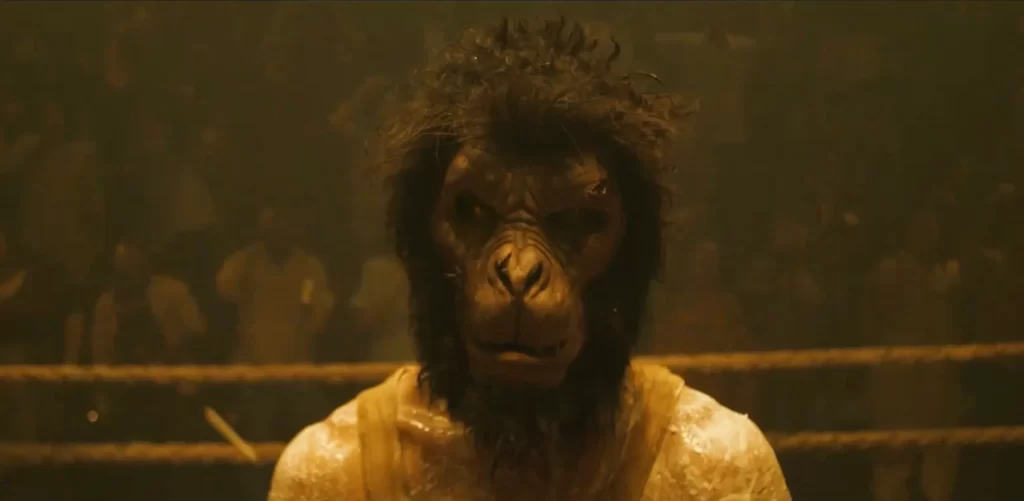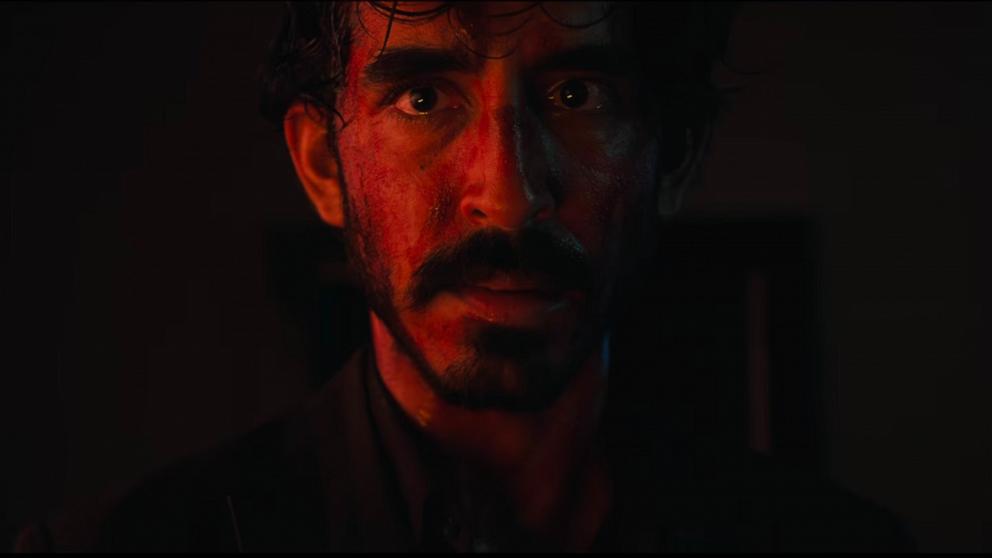
Did you know that Dev Patel looks good with his shirt off? The actor isn’t widely regarded as a sex symbol, despite some sticky fumblings with women in The Green Knight and the underrated Wedding Guest. Monkey Man, Patel’s feature directorial debut, is primarily a chance for him to demonstrate his filmmaking chops, but it also serves to showcase his well-earned immodesty. With his careless mane of black hair, a square jawline covered by a trimly untrimmed beard, and enough abs to fill a supermarket soda aisle, he’s a matinee idol with the unforced charisma to match. It’s only fair that he spends much of the movie getting his face bloodied to a pulp.
In fact, when Monkey Man opens, Patel’s character routinely receives bone-crunching body blows, and not as a consequence of any vigilantism; it’s just his job. Credited as Kid—though he also goes by the alias Bobby, not to mention the title moniker—he moonlights at an underground Indian boxing club, where he functions as (to borrow from an upcoming release) the designated fall guy, wearing a monkey mask and throwing fights in exchange for a meager cut of the take. (Given that he never seems to win a match, it’s unclear how the house makes any money, but let’s not worry about plausibility.) His earnings are commensurate to his suffering; as explained by the establishment’s oily promoter (a welcome Sharlto Copley), he needs to really wow the crowd with his injuries in order to collect the coveted “bleed bonus.” It isn’t exactly a glamorous lifestyle, but Kid’s pain is a tolerable means to a very specific end.

The details of his agenda are both inscrutable and uncomplicated. The screenplay, which Patel wrote with Paul Angunawela and John Collee, frames the narrative in the context of an upcoming Diwali election, which is being dominated by the “sovereign” party—a vaguely Trumpian, pseudo-populist movement led by a charismatic, quasi-religious figure named Baba Shakti (Makarand Deshpande). Kid’s early maneuverings in Monkey Man —he lands grunt work at a swanky hotel run by a hard-charging manager (Ashwini Kalsekar), then finagles a promotion by offering gambling tips to her energetic middleman (a fun Pitobash)—don’t seem much connected to this, though Kid does fixate on Baba’s unsmiling chief of police (Sikandar Kher). Patel seeks to flesh out the character’s backstory with crude, jagged flashbacks to his childhood, when he lived blissfully with his mother (Adithi Kalkunte) and heard fairytales of an almighty monkey. These inserts are designed to build mystery and tension, but they really do the opposite, raggedly deflating the present story’s brisk pacing even as they lay the groundwork for a thoroughly predictable reveal.

Suffice it to say that Kid has a few bones to pick (and break) with the nation’s political elite. His single-minded quest for vengeance inevitably recalls the John Wick pictures, a comparison the film happily lampshades when an arms dealer hawks his merchandise with the line, “Same gun he used in the movie!” But despite some surface similarities (Kid befriends a puppy and even trains it to evade security), Monkey Man doesn’t aspire to that franchise’s ornate mythology. It’s more concerned with ground-level persistence and cascading violence—not so much in the Rambo-esque sense of an obsessed man toppling an entire empire, but in the more pragmatic recognition that killing people is hard and messy and requires an awful lot of work.
As an action director, Patel evinces a keen understanding of the genre, delivering set pieces that are at once gritty and operatic. His camera tends to favor intensity over clarity (the cinematographer is Sharone Meir, who shot Whiplash), and some of the frantic cutting is Greengrassian in its hectic chaos. But there is real weight to the combat, which feels like the product of physical labor rather than the detached rendering of weightless special effects. When Kid punches his many foes, you feel his bones splinter and his muscles ache.

Yet for all of Monkey Man’s wild fury, it is also deceptively polished, even showy. Patel makes vivid use of neon, bathing the frame in deep hues of purple and orange. He also spices up the savagery with imagination and flair; a sequence where Kid battles an axe-wielding lunatic bristles with vivacity and surprise, while the shot of him driving a knife into an adversary’s neck with his teeth is destined to be included in future montages of cinematic highlights. Certain decisions—a lengthy roving take during a bar brawl, a cover of “Somebody to Love” soundtracking a melee—would seem like pastiche if they weren’t executed with such verve and audacity. (The electronica-heavy score by Jed Kurzel only amplifies the picture’s relentless vigor.)
Patel is sensible enough to recognize—or, if you’re cynical, foolish enough to believe—that the movie requires a human dimension, and he attempts to lend it one in its third act, when a severely wounded Kid finds himself tended to by a group of trans outcasts. These scenes are tender and thoughtful, putting a unique spin on the standard regrouping-hero trope; in particular, the sequence where Kid times his assaults on a punching bag to the accompaniment of a nearby drummer turns the typical training montage into an inspired percussive performance. Yet the pivot also feels somewhat schematic, pitting Baba’s generic demagoguery against a hazily marginalized sect without grappling with the sociological implications. It’s the veneer of thematic significance without the legwork.

Still, it’s difficult to chastise Patel for a surfeit of ambition, even if his unruly storytelling doesn’t always mesh with his brute-force filmmaking. Monkey Man inevitably builds to one of those epic confrontations, and the banality of its big bad is camouflaged by the beauty of the staging: two mortal enemies facing off, backdropped by an evocative mural that seems to glow with fire. It’s a symbol of the movie’s primal pleasures, as is the scene where Kid, donning his simian mask one last time, obliterates an opponent with a single, powerful kick. Patel may be toying with some interesting ideas, but Monkey Man’s achievements aren’t intellectual. They’re animal.
Grade: B
Jeremy Beck is the editor-in-chief of MovieManifesto. He watches more movies and television than he probably should.
